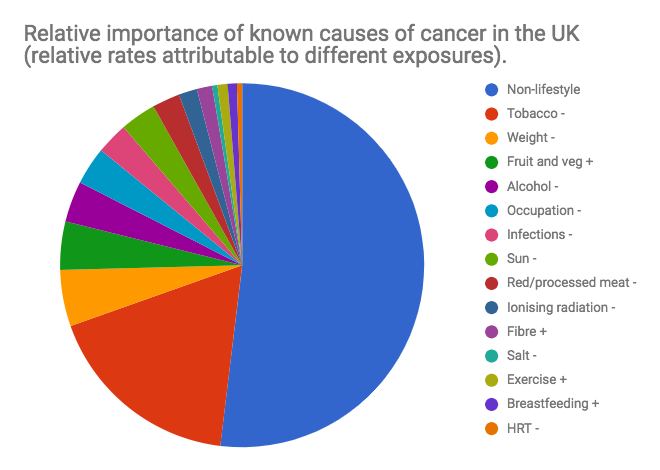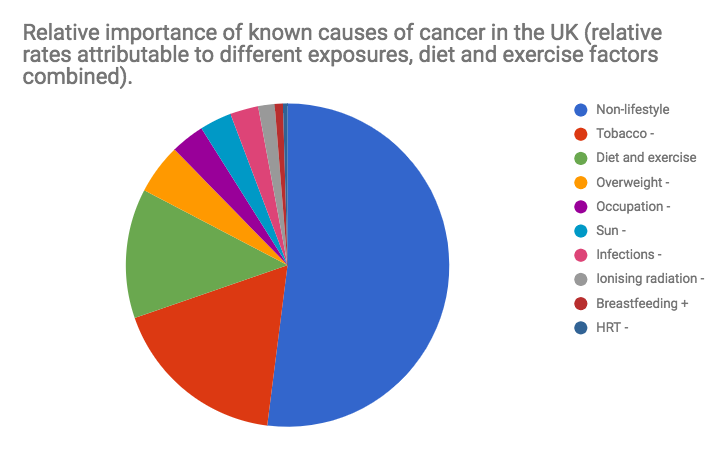|
Cancer Research UK (CRUK) recently launched a social media campaign aimed at raising awareness that obesity is the second biggest preventable cause of cancer, after smoking. I was alarmed. I then looked at the data supporting the claim and changed my mind. First up, it is important to realise that CRUK are only talking about preventable cancers. Fourteen factors have been identified, which are responsible for a total of 43 % of cancers in the UK. More globally, the World Health Organisation agrees that around 30-50% of cancer cases are preventable. This means that if you take a sample of 100 cases of cancer in the UK, on average, 43 of those cases could have been prevented were those people to have had optimal levels of the fourteen factors. 57 of those people, sadly, would have got cancer, no matter how healthy their lifestyle was, because their case was due to other factors, such as their genetics. Some slim people will be among these patients. This doesn’t mean that a slim person won't get cancer. It just explains how it is possible for overweight to be a cause of cancer, while slim people can still get cancer. CRUK’s claim failed to make clear that the majority of cancers are not known to be preventable, and in doing so, caused some confusion, so I have addressed this by drawing up a pie chart, using the same source data as CRUK, which as well as including the fourteen lifestyle factors, also includes the other "non-lifestyle" cancer cases, for which a preventable cause hasn't been identified. Smoking was found to be responsible for 19.4 % of all new annual cancer cases in the UK (in 2010). That’s the big red chunk responsible for more cancers than any other preventable factor. Excess weight was responsible for a further 5.5%, the fairly sizeable orange slice of pie. But, CRUK have taken a small liberty with the data - dietary factors (suboptimal levels of fruit and veg, fibre, red meat and salt) sum to 9.2 % of cancers. By dividing them up into small slices, they have downplayed the relative importance of a healthy diet. Add insufficient exercise to the list and you are up at 10.2 %, and alcohol brings it to 14.2%. This means that diet and exercise are nearly three times as important as weight! Let’s redraw that pie chart. Now diet and exercise become the second most important cause of preventable cancer (green slice), while overweight is demoted to a (still important) third place. CRUK are correct only insofar as the data support healthy weight being better than overweight. However, I hope that this persuades you that the person who eats healthily, avoids alcohol and keeps active, yet struggles to keep their weight down, is statistically far less likely to get cancer than the skinny couch potato who lives on bacon washed down with gin. The person who eats healthily, avoids alcohol and keeps active, yet struggles with their weight, is less likely to get cancer than the skinny couch potato living on bacon washed down with gin. CRUK have been accused of being judgemental about obesity. They are on a mission to educate people to empower them to make informed choices to reduce their own risk of cancer. 5.5 % may be a small fraction of the total, but that percentage relates to over 17,000 people per year in the UK. Over 17,000 individuals, each with families and friends. How could a responsible educator fail to make this point, for the sake of avoiding offence? I certainly hope that they had no ulterior motive to shame people who are overweight or obese. They do recognise that weight management is difficult in our environment, and are campaigning for changes which will help to make weight management easier, such restricting junk food advertising. However, given the relationship between diet, exercise and weight management, perhaps they could have promoted the more positive message, that an active lifestyle and healthy diet - lots of fibre, fruit and veg, avoiding salt, alcohol and red/processed meat - is the best thing you can do after not smoking to reduce your risk of cancer. Worrying about your weight should be a secondary concern when it comes to cancer. Cancer Research UK run the risk of encouraging unhealthy, fad diets By focussing on weight in their social media campaign, CRUK run the risk of encouraging unhealthy, faddy ways to lose weight, rather than sustainable, healthy choices. There is no conflict of the decision to make here, as staying active and keeping the identified dietary factors at optimal levels are consistent with advice to encourage weight management and more importantly, add up to a reduced overall risk of cancer.
|
AuthorFitness and Pilates instructor with a passion for science. Archives
November 2021
Categories |


 RSS Feed
RSS Feed
